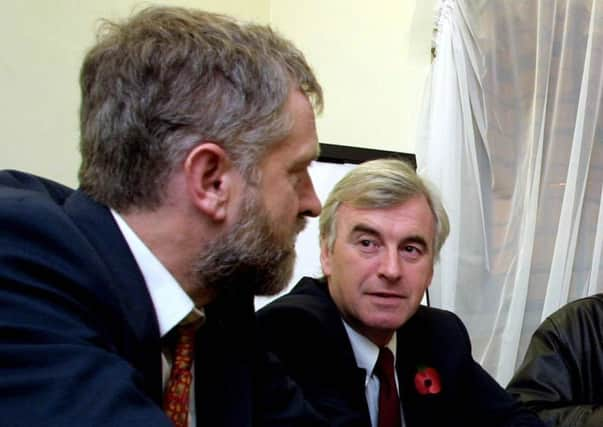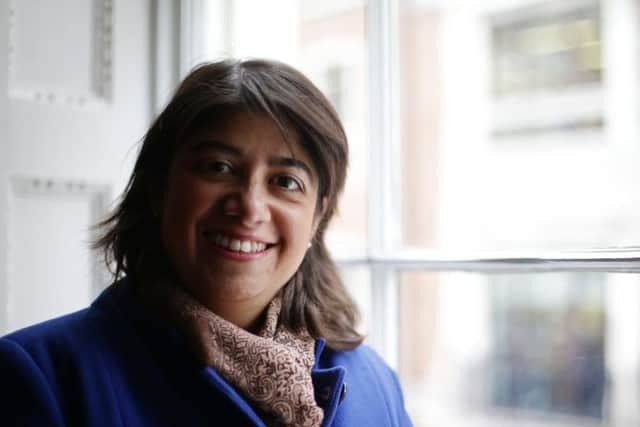Corbyn cabinet: Burnham and McDonnell get top jobs


The newly-elected Labour leader appointed Mr Burnham to the shadow home secretary role vacated by Yvette Cooper.
Ms Cooper, who came third in the race to succeed Ed Miliband and made clear during the campaign she would not serve on the veteran left-winger’s frontbench, will head a taskforce examining the refugee crisis.
Advertisement
Hide AdAdvertisement
Hide AdAfter a day of behind-the-scenes negotiations, the first confirmed appointments also included Hilary Benn as shadow foreign secretary, Heidi Alexander as shadow health secretary and Lord Falconer, a close ally of Tony Blair, as shadow justice secretary.


John McDonnell has been rewarded for steering his fellow left-winger to the Labour top job with perhaps the most crucial shadow cabinet role.
Many thought that Jeremy Corbyn would resist the temptation to put one of the few figures considered more radical than him in charge of the economic brief, for the sake of maintaining party unity.
But his fellow rebel is now in charge of translating the anti-austerity platform that helped propel his close ally to the leadership into hard policies that could appeal to sufficient voters to win the 2020 general election.
The pair established an unofficial opposition under Tony Blair, defying the New Labour leadership on a string of key policies.
But the Liverpool-born Socialist Campaign Group chair and one-time GLC deputy to Ken Livingstone can be less restrained in expressing their shared convictions.
He recently declared he would “swim through vomit” to vote against benefit cuts in defiance of the party line and faced criticism for telling a union event that he would “like to go back to the 1980s and assassinate Thatcher”.
As the co-ordinator of the Corbyn campaign he masterminded the successful push to get his friend onto the ballot paper - after failing in 2007 and 2010 to do so for himself.
Advertisement
Hide AdAdvertisement
Hide AdThe 64-year-old married father-of-three has spearheaded fights against the expansion of Heathrow Airport which is in the west London Hayes and Harlington constituency he has represented since 1997.
Chuka Umunna and Mary Creagh added their names to a lengthy list of senior figures returning to the backbenches over stark differences with Mr Corbyn over key policy areas.
Mr Umunna, who was shadow business secretary and briefly a leadership candidate, said he “clearly had some differences in view” with Mr Corbyn, most significantly over Europe.
He expressed particular concern that Mr Corbyn appeared unwilling to guarantee that Labour would campaign to remain in the European Union in the forthcoming referendum on continued membership.
“It is my view that we should support the UK remaining a member of the EU, notwithstanding the outcome of any renegotiation by the Prime Minister, and I cannot envisage any circumstances where I would be campaigning alongside those who would argue for us to leave,” he said.
“Jeremy has made it clear to me that he does not wholeheartedly share this view.”
Mr Corbyn was declared Ed Miliband’s successor on Saturday on the back of a surge of support from activists that saw him attract a massive 59.5% of votes - topping the ballot among party members as well as trade unionists and new supporters.
But the immediate resignations of a string of senior figures who declared themselves unable to serve in his top team underlined the task he faced forming a shadow cabinet that balanced socialist allies and respected moderates - while meeting an aim for a 50:50 gender balance.
Advertisement
Hide AdAdvertisement
Hide AdMary Creagh, the shadow international development secretary, said she had “decided to return to backbenches and campaign on Labour ‘yes’ in the EU referendum, Syria refugee crisis, and a better deal for people in Wakefield”.